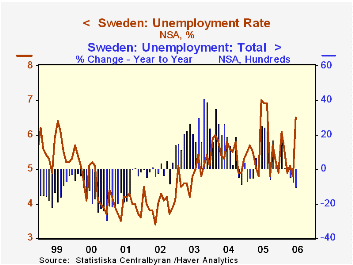 Global| Jul 27 2006
Global| Jul 27 2006Low Unemployment in Nordic Countries
Summary
Unemployment is falling in Europe. With the notable exception of the UK, unemployment rates are moving lower in most European countries. In May, the rates in Germany and France were both at their lowest since late 2002. Today, the [...]

Unemployment is falling in Europe. With the notable exception of the UK, unemployment rates are moving lower in most European countries. In May, the rates in Germany and France were both at their lowest since late 2002. Today, the three Scandinavian countries reported their latest rates. Denmark's labor force survey set records. In the 18-1/2 years of the Danish data, June saw the smallest number unemployed, 123,100, and the lowest unemployment rate, 4.5%, which was first reached in May. The number unemployed is down 23.7% from a year ago, before seasonal adjustment. (The other monthly figures are seasonally adjusted by Denmarks Statistiks.)
In Norway, the government's public employment service tallies its number of "registered" unemployed. These data are not seasonally adjusted, so they show a monthly increase for July. But the year-to-year comparisons are impressively favorable: the number unemployed is down more than 20,000 to 67,800 and the unemployment rate reached 2.8% from 3.7% in July 2005; this is the lowest July figure since 2001.
Sweden's data are a bit muddled, but they still show improvement. Statistics Sweden switched to the EU Harmonized structure of labor force data in April 2005, so data prior to that are not totally comparable with current results. Indeed, the graph shows a change in the pattern of the monthly evolution beginning at that time. However, we can still make a valid year-on-year comparison for June, and we see that the rate then was 6.5%, down from 7.0% in June 2005; the number unemployed is off 10.2%.
A similar story can be told for Finland, which published its June data on Tuesday. The current unemployment rate is 8.1%, the lowest rate for June since 1991.
In all these countries, these rates are falling because employment is rising. The release of data for employment lags or is compiled only quarterly, so comparisons aren't so clear, but what is clear is that through the latest available data, however counted, the number of jobs is increasing faster than the number of people seeking work. As we point out often to highlight the important distinction, unemployment can fall if jobs are tight and people give up seeking work altogether. But this is not the case now: jobs are up and joblessness is down.
| Thous. | July 2006 | June 2006 | May 2006 | Apr 2006 | Year Ago | 2005 | 2004 | 2003 |
|---|---|---|---|---|---|---|---|---|
| Denmark LFS*, Seas Adj | -- | 123.1 | 124.9 | 133.0 | 161.2 | 153.4 | 172.9 | 167.1 |
| Rate (%) | -- | 4.5 | 4.5 | 4.8 | 5.8 | 5.6 | 6.3 | 6.0 |
| Norway Reg.*, NSA | 67.8 | 62.3 | 60.6 | 66.6 | 89.3 | 76.2 | 84.9 | 91.7 |
| Rate (%) | 2.8 | 2.6 | 2.5 | 2.8 | 3.7 | 3.0 | 3.6 | 3.9 |
| Sweden LFS*, NSA | -- | 297.6 | 216.8 | 247.5 | 331.4 | 263.1 | 246.1 | 217.0 |
| Rate (%) | -- | 6.5 | 4.8 | 5.1 | 7.0 | 5.7 | 5.5 | 4.9 |
Carol Stone, CBE
AuthorMore in Author Profile »Carol Stone, CBE came to Haver Analytics in 2003 following more than 35 years as a financial market economist at major Wall Street financial institutions, most especially Merrill Lynch and Nomura Securities. She had broad experience in analysis and forecasting of flow-of-funds accounts, the federal budget and Federal Reserve operations. At Nomura Securities, among other duties, she developed various indicator forecasting tools and edited a daily global publication produced in London and New York for readers in Tokyo. At Haver Analytics, Carol was a member of the Research Department, aiding database managers with research and documentation efforts, as well as posting commentary on select economic reports. In addition, she conducted Ways-of-the-World, a blog on economic issues for an Episcopal-Church-affiliated website, The Geranium Farm. During her career, Carol served as an officer of the Money Marketeers and the Downtown Economists Club. She had a PhD from NYU's Stern School of Business. She lived in Brooklyn, New York, and had a weekend home on Long Island.
More Economy in Brief
 Global| Feb 05 2026
Global| Feb 05 2026Charts of the Week: Balanced Policy, Resilient Data and AI Narratives
by:Andrew Cates





